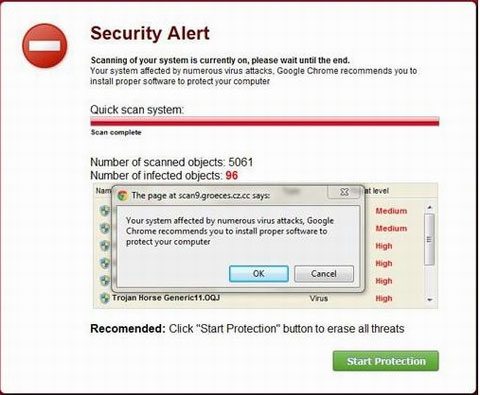You don’t need antivirus software to create a perfect defense mode for your computer, preventing it from ever being infected with harmful malware.
>> Exposing the 25 Most Terrifying Computer Viruses of All Time
>> The Computer Viruses That Drive the World Crazy
Here are some simple ways to ensure you never get infected with a virus:
1. Be Cautious of Fake Play/Download Buttons
These buttons are often integrated into websites to trick users into clicking them, leading to the download of unrelated content that can infect users with viruses and malware. Therefore, think twice before clicking a download button. If you’re familiar with the website, reconsidering will help you determine if the download button’s location has changed.
Check the status bar; if the domain name there differs from the website address you are visiting, it might be a malicious advertisement.
Another approach is to use logic. For example, if you download some software and it displays a button labeled PLAY NOW, you can immediately recognize that this button is irrelevant and should not be clicked.
2. Never Use Internet Explorer
Even though IE9 has significantly improved its security, the Internet Explorer browser remains a primary target for hackers due to its widespread use on computers today. Therefore, users should switch to less common browsers, such as Google Chrome.
3. Ignore Pop-Ups
Sometimes an antivirus software will generate pop-ups, misleading users into thinking they have detected a “threat” and prompting them to download a specific software to fix it. However, users should be wise and close those pop-ups.

Users should ignore pop-ups originating from the browser. As a general rule, disregard any security-related messages if you are unfamiliar with them, such as clicking the SCAN button on antivirus software. For instance, if you receive a notification to scan your computer from an application you have never installed, it means your computer is likely infected with a virus.
4. Avoid Public Torrent Websites
Most public torrent websites harbor hidden malware and scams. Users often utilize torrent sites to download movies, but many public torrent sites conceal numerous viruses and fake files for users to download. Therefore, movie enthusiasts should opt for private trackers, as these sites are only open to members and have strict policies, making it harder to gain approval for new member registrations compared to public torrent sites.
5. Use VLC Player to Check Downloaded Movie Files

If you ignore the advice above and still download movies from public torrent sites, they may be fake. It can be challenging to determine if they are genuine or not due to standard sizing, but when you run that file, you might see a message indicating that you need to download a new video player. Therefore, avoid downloading movies from public websites and use VLC Player to check any downloaded video files.
6. Do Not Open .exe Files Sent to You
If someone sends you a packaged Flash game with .exe files or any other files, delete them immediately. Be cautious with .exe files attached to emails, etc.
7. Avoid Searching for Common Utilities on Google
A concerning trend is that websites containing malware often rank highly in Google’s search results for common utilities. Users think they are downloading the best video player, but in reality, hidden viruses lurk within. Therefore, if you want to find utilities, always visit reliable websites from software manufacturers.
8. Create Guest Accounts for Family Members
If your computer is shared by multiple family members, create guest user accounts for them. This prevents those users from having the permissions to download and install malicious software on your computer.




















































